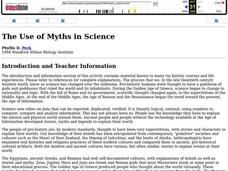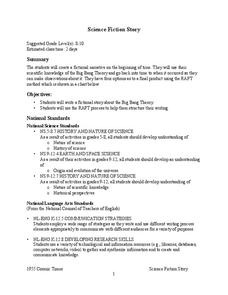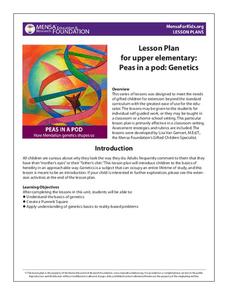Curated OER
Using Vegetation, Precipitation, and Surface Temperature to Study Climate Zones
Using NASA's Live Access Server, earth scientists compare the temperature, precipitation, and normalized difference vegetation index for four different locations. They use the data to identify the climate zone of each location using...
Curated OER
The Use of Myths in Science
Students examine folk tales to determine the basis for scientific myths. They demonstrate through the discussion of the folk tales that the perception of the world has changed as new information is gained. They write their own folk...
Curated OER
The Quicker the Better? Food Processing
Kids explore food choices, nutrition, and agriculture through a variety of sources and activities. They research unknown words on food labels, test the salt content in canned vs non-canned foods, and discuss processed foods. The lesson...
Towson University
Mystery Tubes
How do scientists know they're right? Truth be told, they don't always know. Explore the scientific process using mystery tubes in an insightful activity. Young scientists discover how to approach and solve problems in science, how ideas...
Science Matters
Plot Study
Small groups investigate plots of land to discover how abiotic and biotic factors interact. After recording their findings, scholars share observations with peers and self-reflect on the learning process.
Curated OER
Mining in a Nutshell
Your class will love this geology-inspired set of activities that demonstrate the processes through which we are able to use mineral resources. They describe the major steps that a company must follow from initial discovery of a mineral...
National Wildlife Federation
What is DBH?
When measuring the circumference of a tree, does it matter how high you place the measuring tape? Most scholars have never considered this question, but scientists know that measurement techniques must be standardized. The 13th lesson in...
Ahisma Summer Institute
The Power of One - Math in a Different Angle
In this 2-day lesson focused on exponents, middle schoolers will cross the curriculum by engaging in science, history and language arts activities. Exponential growth will be explored using grains of rice on a chess board. Exponential...
Discovery Education
Jets in Flight
This Discovery Education activity provides the information needed to understand the basics of flight. Before taking off, young pilots learn the eight stages of the engineering design process. Small groups then design and build an...
NASA
Science Fiction Story
A instructional activity allows you to go back in time and see the big bang actually happen. Bazinga! In reality, pupils research the Big Bang Theory and theorize what it would be like to go back in time and see it happen. There are four...
Science 4 Inquiry
The Ins and Outs of Photosynthesis
The most important chemical process on Earth is photosynthesis. Scholars explore the changes in the gases in our atmosphere as life on Earth developed. They create a model of photosynthesis and consider simple questions.
Drexel University
Learning Roomba Module 1: Robotics Introduction
Introducing Mr. Robot. As an introduction to robotics, class develop a definition of a robot and make distinctions between real robots and those in science fiction. They also study the basics of programming in Java to program a Roomba.
Rainforest Alliance
Investments in Forest Carbon
One hundred metric tons of CO2 can accumulate in one acre of forest over time—that's a lot of carbon! In the activity, groups of middle school learners determine what makes forests important. They then solidify the concept by using a...
MENSA Education & Research Foundation
Peas in a Pod: Genetics
Can peas have grandparents? Learn about inherited traits and heredity with a set of activities focused on Mendelian genetics. As your class learns about the process of passing traits along in Punnett squares, they take on the role of...
Curated OER
Summer Science Recipes: Experiments on the Grill and in the Kitchen
Generate ideas about the most scientifically sound ways to prepare foods safely and efficiently during the summer season. Learners will use the GED Connection Science Workbook, so they can practice the skills needed to prepare for the...
Curated OER
Planets in our Solar System
A wonderfully designed, and very thorough lesson plan on the planets in our solar system. Designed for third graders, this lesson has learners use technology and multimedia tools to research, explore, and create information about the...
Curated OER
What is the Nature of Science?
Conduct a survey about the nature of science with your high schoolers. They will record their responses in a table and then discuss the implications of scientific theory. Note: There are activity sheets, and forms included with this...
Curated OER
Motion in the Ocean
How does the formation of currents and waves in the ocean happen? High schoolers will learn about the primary causes for ocean currents and waves by calculating a wave's amplitude and nautical mile speed. Then they will complete a...
University of Georgia
Energy Content of Foods
Why do athletes load up on carbohydrates the evening before a competition? The lesson helps answer this question as it relates the type of food to the amount of energy it contains. After a discussion, scholars perform an experiment to...
Curated OER
High-Tech Food: Science in Your Shopping Cart
Kids are given a lot to think about, as they delve into the world of high-tech foods. They discuss GMOs, biotechnology, food enhancements and domestication. They view videos, engage in class discussions, complete worksheets, and learn...
Curated OER
A Walk in the Tundra
Discuss the environment of the Arctic tundra using this resource. The focus of this lesson is the story A Walk in the Tundra by Rebecca L. Johnson. The appealing illustrations are bound to captivate your class! After reading the story,...
Virginia Department of Education
DNA Extraction from Strawberries
Has your class ever been astounded by the complexity of DNA analysis? Have they ever asked why genetic engineering has become so important to our daily lives? Young scientists perform DNA extraction on strawberries and explore how the...
Curated OER
Fueling Extreme Weather
First graders identify the different stages in the hydrologic cycle. To study earth science, they investigate how sunlight affects the earth's temperature. They also discuss how the sun's energy is transformed.
Nuffield Foundation
Following Gene Transfer by Conjugation in Bacteria
After the lab, you'll be able to solve this analogy: Natural selection is to vertical transfer of genes as ___ is to the horizontal transfer of genes. Young biologists conduct an experiment on E. coli bacteria to explore the process of...

























